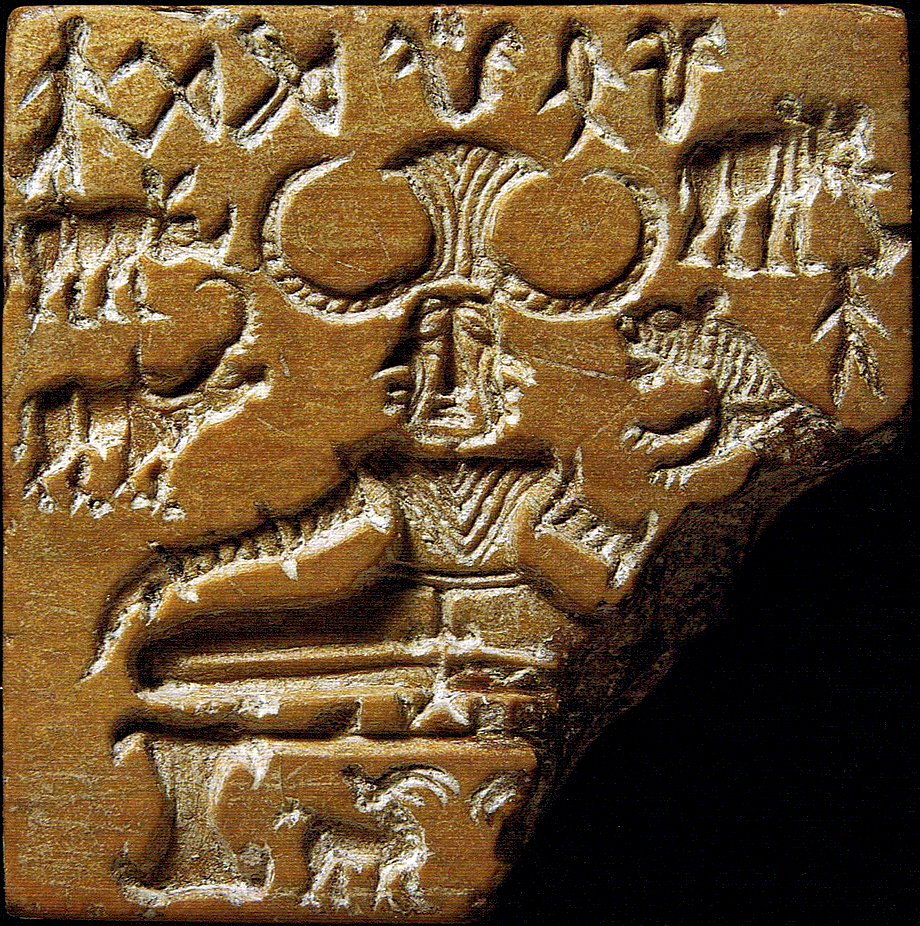An Introduction
to the Original 1776
Bavarian Order of the Illuminati
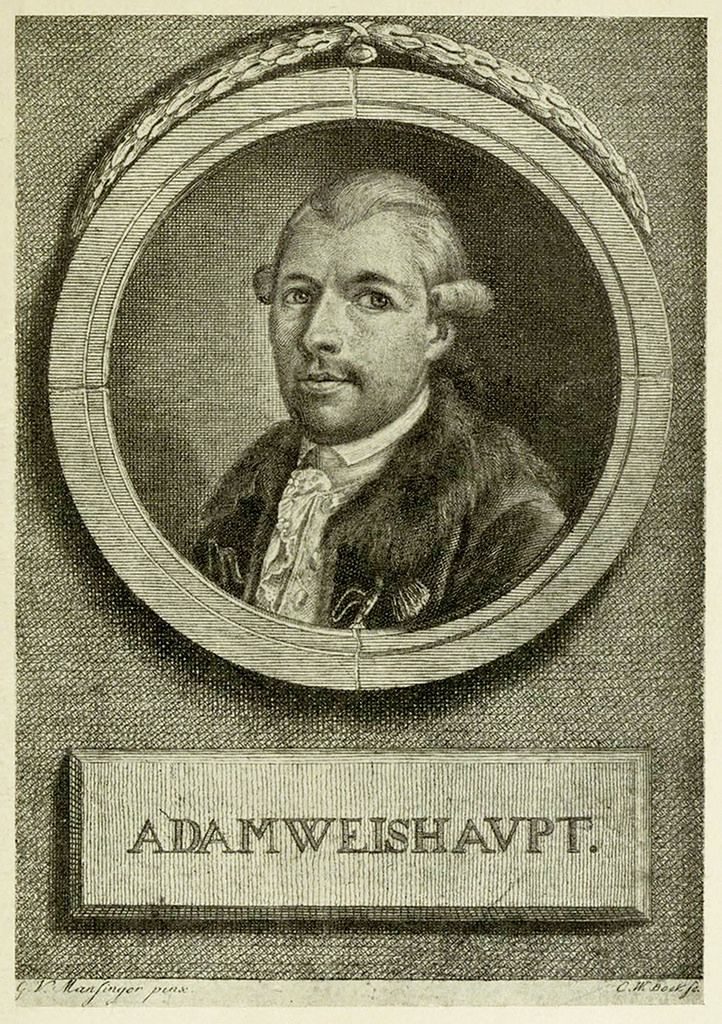
Origins
The original order of the Bavarian Illuminati was founded on the First of May in the year 1776. The founder of the order was Adam Weishaupt (1748 – 1830), who was raised by his godfather, the Baron von Ickstatt. Ickstatt was a member of the Privy Council, a professor at the University of Ingolstadt in Bavaria and the tutor of Maximillian III Joseph, Elector of Bavaria.
Attending the Jesuit University of Ingolstadt with his godfather’s patronage, Weishaupt became the first non-Jesuit chair of canon law at the university for nearly a century.
The liberal layman’s appointment to the chair of ecclesiastical law made him a prominent object of Jesuit wrath. The Jesuits were dissolved by Pope Clement XIV just three years before the Order of the Illuminati was officially founded. Weishaupt intended for his Illuminati to replace the obedient order of Ignatius of Loyola as the paramount force of education and enlightenment in Germany.
The Order of the Illuminati structure was mainly modeled on the Jesuit order. However, Weishaupt also borrowed much from the Craft after he was made a Strict Observance Freemason in the Bavarian capital of Munich in 1777. The original name of Weishaupt’s order was the Perfectibilists or ‘Perfectionists,’ for their aim of the “perfection of man.”
After Weishaupt was raised a Master Mason, being dissatisfied with the awkward name, his order became ‘Illuminatenordens,’ and represented itself with the symbol of the point within the circle. The Unknown Superiors or Secret Chiefs of Strict Observance Freemasonry inspired the structure of the Illuminati hierarchy. By 1779 the Order of the Illuminati had assumed leadership of the Masonic lodge in Munich.
The original five Illuminati were: Adam Weishaupt, known by his secret order name “Spartacus,” and Weishaupt’s law students Franz Anton von Massenhausen “Ajax,” Max Edler von Merz “Tiberius,” Andreas Sutor “Erasmus Rotterdamus” and Bauhoff “Agathon.”
The order rapidly grew into at least 2,500 members within a decade. Members came from the ranks of academia, the nobility and government bureaucracy, the diplomatic community, the legal establishment, the military, various police forces, the medical profession, the Church, and other essential institutions.
Mutually fearing an educated and organized atheism, the Catholic Jesuits joined forces with their Protestant rivals, the German Rosicrucians, to destroy this threat to their way of life and socio-political dominance. In the 1780s the Elector of Bavaria, Duke Karl Theodor, issued several edicts banning the order and ultimately threatening the membership with death.
The Bavarian Elector and his agents interrogated and persecuted members until the Order of the Illuminati was dissolved. Many of the adepts fled Bavaria to various parts ruled by friendly sovereigns like the Duke of Saxe- Gotha.
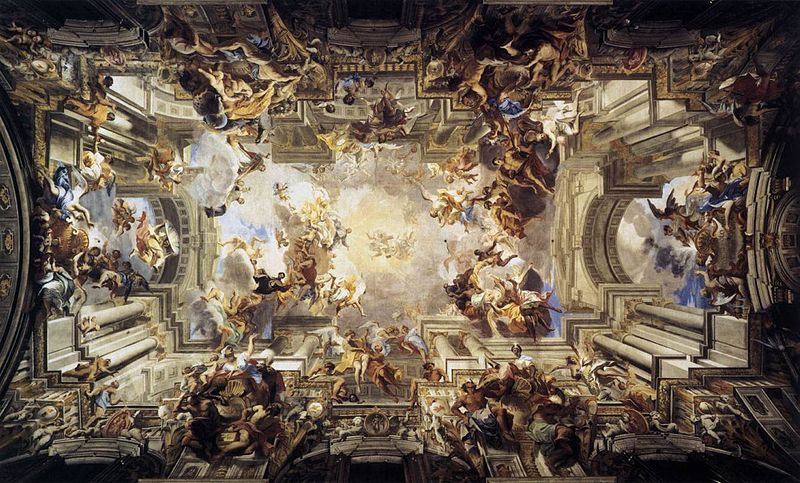
Weishaupt’s second-in-command was diplomat Xavier von Zwack (1756 – 1843). Zwack was one of Weishaupt’s law students and joined the Illuminati in May of 1776. Zwack resigned from the Illuminati in 1784 over Weishaupt’s despotic control over the clandestine order. In 1786 police raided the private residence of Xavier Zwack in Landstut and found secret order documents among his private possessions.
Among Zwack’s documents were found the cipher of the Order of the Illuminati, the order’s calendar, the code names of geographical locations, and the list of members initiated from 1776 to 1779. Also discovered was Zwack’s defense of suicide, the atheistic work Better Than Horus (Zwack was personally opposed to atheism), ceremonial liturgy, and scandalous plans for creating an order for women.
The government swiftly published Zwack’s documents in Munich as Some Original Works of the Order of the Illuminati, as evidence of the order’s intrigue aimed to tear down religion and government, and rule the world as a secret society.
Baron Adolph Franz Friedrich Ludwig Baron von Knigge (1752 – 1796), a supporter of the French Revolution, joined the order in 1780 and helped to reorganize the grades and recruit European Freemasons for the Illuminati. In 1781 he wrote On Jesuits, Freemasons and German Rosicrucians in opposition to the superstition rampant in the mystical orders.
Knigge resigned in 1784 over leadership differences, decrying Weishaupt’s maneuvering for dictatorial control over the order, accusing him of management similar to the Jesuits.
Princes, Poets, Philosophers and Musicians
Knigge had connections with the court of Hesse-Kassel and Weimar, so Karl, Landgrave of Hesse-Kassel was insinuated into the order in 1783. Hesse-Kassel was an important center of alchemy since the time of Landgraf Moritz von Hessen-Kassel (1572 – 1632). The Landgraf was a prince, scientist and alchemist renowned for owning and operating one of the best laboratories in the world.
The alchemist prince had among his vast alchemical library manuscripts by Geber, Aquinas, Basilius Valentinus, Roger Bacon and Raymond Lull. Flanked by his entourage of laboratory assistants, Moritz was the very center of the elite inner circle of European alchemists originating in Germany. Within his alchemical furnaces, praised at the time as sacred altars, were birthed the mnemonics of the Rosicrucian Michael Maier (1568 – 1622) and its sister, Baconian science.
The Illuminatus Savalette de Langes, a French Royal Treasurer in the Masonic Lodge Les Amis Reunis, organized functions like concerts, balls and soirées for the elite. He was associated with the Jacobin Louis-Philippe Joseph, Duke d’Orleans (1747 – 1793), Grand Master of the formidable Grand Orient in France from 1772, who established the Grand Orient in Enlightenment ideas.
The Duke d’Orleans helped finance and organize propaganda and revolutionary mobs; he was also pivotal in the execution of his cousin, King Louis XVI. The Illuminatus Roettiers de Montaleau (1748 – 1808), once Master of Les Amis Reunis, followed Duke d’Orleans as Grand Master of the Grand Orient in 1785, and was Grand Master of all lodges in France in 1795. Ernst II, Duke of Saxe-Gotha-Altenburg (1745 – 1804) was Grand Master of Freemasons in Germany and joined the Illuminati in 1783.
Philosophers, poets and musicians were brought into the order. J.J.C. Bode initiated Johan Wolfgang von Goethe (1749 – 1832), author of Faust. The protagonist of Faust, a learned alchemist, transcends earthly knowledge and signs a pact with the devil (Mephistopheles), selling his immortal soul for the secrets of Creation, power and the experience of the ultimate pleasure. The character Faust was drawn as a reflection of Goethe, himself.
The psychologist Carl Gustav Jung (1875 – 1961) modeled his own form of alchemical magic, Analytical Psychology, on the great Goethe’s Faustian paradigm.
Two of Ludwig van Beethoven’s music teachers and his first publisher (who also first published Joseph Haydn, Robert Schumann and Felix Mendelssohn) were all Illuminists. The Illuminist Bonn Reading Society commissioned a cantata by Beethoven on the occasion of the death of the Holy Roman Emperor Joseph II.
As a matter of curiosity, Wolfgang Amadeus Mozart (1756 – 1791) was initiated into the lodge Zur Wohltatigkeit (Beneficence) in 1784 and raised the next year in the lodge Zur Wahren Eintracht (True Harmony) in Vienna. Mozart based his last stage work, the opera, “The Magic Flute,” on his Masonic degrees. His father Leopold Mozart was a Freemason, but he despised the Illuminati.
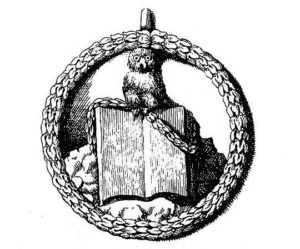
Inside the Illuminati
The lodge of the Illuminati met on the full moon at night in an isolated and windowless chamber. It had an antechamber and a lodge room, with a bolted door between them. The Superior sits in a chair lit by three lamps, next to a table with a gavel. Rows of chairs line the walls of the lodge on either side of the Superior. The image of the pyramid is on the lodge floor as well as on lodge documents.
The aims of the Order of the Illuminati as outlined in the ‘General Statutes of the Order’ included: Firstly, that the order was benevolent towards religion, state, and universal good morals. It was a humanitarian institution concerned with virtue, justice, and the spread of knowledge. Illuminati promoted good taste, talent, industry, and the liberal arts and sciences, including natural history, government and economics, the humanities and languages.
The order taught moderation, the golden rule, brotherly love and courtesy, and a special respect for elders and superiors. It recommended a Confucian piety between family members and members of hierarchical organizations. It expected honesty and claimed to have omniscience in regards the personal lives of its members. Nonetheless, there was trouble within the leadership, and the order was undone by enemies from without.
Adam Wieshaupt deeply respected the Western Mystery Tradition. He applauded the gymnosophists in the Indies (Indian yogin ascetics), the priests of Isis in ancient Egypt, the initiates of the Rites of Eleusis, and the likes of Zoroaster and Pythagoras. He despised superstition and thus discounted all forms of alchemy, magic, theosophy, spiritualism, Kabbalah or the occult in general.
Wieshaupt’s strict adherence to reason caused him to abhor anything that gave the appearance of being irrational, which turned him off to alchemy, so he never joined the Royal Society to mix with great minds like Robert Boyle and Isaac Newton.
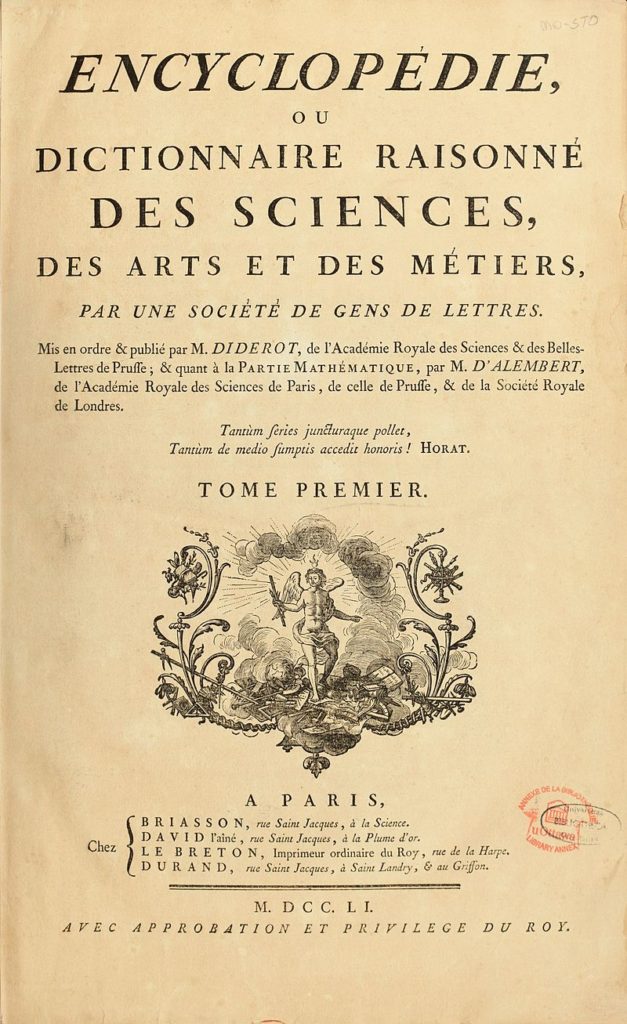
Philosophy
As gentlemen scholars the Illuminati were recommended to study philosophers and men of letters like Plato, Horace, Plutarch, Virgil, Tacitus, Niccolo Machiavelli, Michel de Montaigne, Alexander Pope, Adam Smith, David Hume, Baron d’Holbach and Louis Claude de Saint-Martin.
Weishaupt especially admired his godfather Ickstatt’s tutor, Christian Wolff, a proponent of Pythagorean or Gnostic reincarnation. He also had a high regard for Hugo Grotius, the father of the study of international law; and Gottfried Wilhelm Leibniz, the revered mathematician.
Weishaupt read with pleasure the British empiricists and the French Philosophes. Weishaupt, like his empiricist inspiration, Johann Georg Heinrich Feder (1740 – 1821) wrote emphatically against Kant’s rationalism and idealism. Weishaupt’s fatalist conception of omnipotent destiny suggested that the cosmos unfolds by necessary natural law. The future was predictable. An Illuminatus could flow with the course of history and carry out historic events.
French Physiocrats originated the study of economics while Philosophes like Denis Diderot (1713 – 1784) and François-Marie Arouet Voltaire (1696 – 1778) attacked dogma and tradition in favor of reason and civil liberties. Jean-Jacques Rousseau (1712 – 1778) asserted that the natural origin of government is the social contract, and the General Will of the people should be sovereign over government.
Thomas Robert Malthus (1766 – 1834), whose father was a friend of Rousseau, was a professor at the British East India College, and wrote Essay on Population, a central work on the dangers of overpopulation and the importance of human population management.
Weishaupt was convinced by Rousseau’s ideas of the Noble Savage and the Perfectibility or Illumination of man. The concept of the Noble Savage embodied the idea that the original humans lived at one with nature. The Biblical Adam and Eve were free and unspoiled until sin and subsequent suffering replaced this natural harmonious state. The root causes of suffering are desire, especially for material property; vice; and the subsequent injustice, which replaces liberty with endangerment, fear, servitude and labor.
Weishaupt claimed that the secret object of Jesus Christ (traditionally the ‘Second Adam’) was to guide the corrupted humankind to a return to the original pure and ideal state of natural equality and liberty. In this way Jesus was cast as a revolutionary teaching enlightenment. Weishaupt identified the Freemasons as the hidden order of true Christians.
Weishaupt wanted every man and woman to reach the summits of enlightenment and virtue, that there would be no need on earth for a Church to rule the soul, or a State to rule the flesh. This was the ideal of the Illuminati that has been misinterpreted as a rejection of all authority: all religion and patriotism. Universal love and reason were to govern the world.
Weishaupt would consider himself a humanist world citizen and he would support cosmopolitanism or Globalism over nationalism. Weishaupt, himself, worshipped Reason and did not consider himself a Christian. For him, the Masonic “G” symbolized ‘Grace,’ not the traditional ‘God’ or even ‘Geometry.’ For him the Flaming Star hung in the lodge was not the light of anything divine, but the light of Reason.
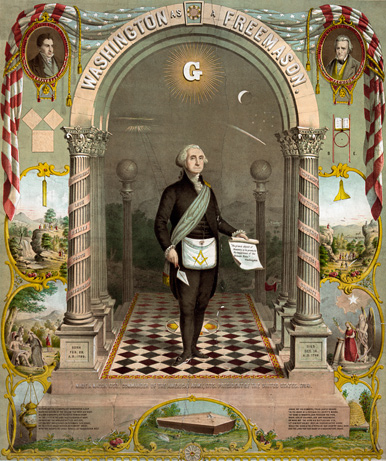
Mutual Support
Like the ancient Siddhartha Gautama (Shakyamuni) Buddha and the Daoist Laozi, the foremost Eastern exemplars of this illumined point-of-view, the Illuminatus does not place the highest value on position, wealth, or other objects of desire. This value system helps regulate selfish competition, envy, avarice, greed and lust, certain causes of disharmony within a community.
In the West the Greek Cincinnatus is the Classical example of a leader with this attitude. He is the symbol of the humble farmer who enters into public affairs only when civil duty demands it and happily retires to his farm and family when he has fulfilled his duty.
Who in one situation is a king, in another situation is a pauper. Appointments and titles are meaningless. Wealth comes and goes and, after all, does not establish happiness.
Quoth the entryway to the Yale Skull and Bones society headquarters, the ‘Tomb,’ “Wer war der Thor, wer Weiser, Bettler oder Kaiser? Ob Arm, ob Reich, im Tode gleich.” In English, “Who was the fool, who was the wise man, beggar or king? Whether poor or rich, all’s the same in death.” This quote supposedly originated from a mysterious German secret society that in 1832 gave its blessing to William Huntington Russell, a founder of the order of Skull and Bones.
The founders of the order of the Illuminati confessed in their documents the ultimate value of community and mutual social support. Like Freemasonry, the order claimed to preserve and teach the holy truths of the ancient Mystery schools. It was distinguished from Freemasonry as being actively engaged in removing all obstacles to general wisdom and virtue in the world. Due to its political agenda, the order professed a purer, more self-sacrificing way of life than could be found in the rank and file of the Craft Freemasons.
The order hinted in its literature of a circle of the world’s greatest intellects where knowledge was shared freely amongst trusted brethren. The diary was a central facet of the system of the brotherhood; diligent and detailed records were to be kept by every member of themselves and their society. Donations to the treasury were given in proportion to wealth and members were given relief as it was needed.
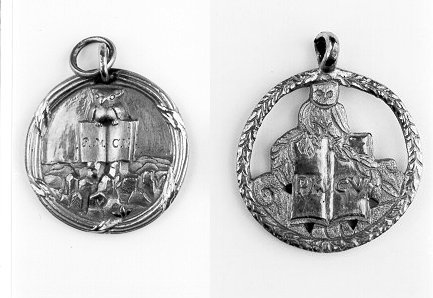
The Minerval Degree
There are nine steps divided into three parts in the Illuminati degree system, the Nursery Grade, the Masonic Grade and the Mystery Grade. The first grade includes the Novice, the Minerval and the Illuminatus Minor degrees. Next are the Masonic Illuminatus Major (Scottish Novice) and Illuminatus Dirigens (Scottish Knight).
The Mystery Grade rises thru the offices of Presbyter (Priest) and Regent (Prince), Magus and Rex. Every member of the order adopted a Classical Greek name for use within the order. Minerva, the goddess of wisdom, was the patroness of this order born in the age of Enlightenment.
Identified with the Egyptian goddesses Isis, Neith and Ma’at, the Greek Pallas Athena inspired the name of the great city of Athens, the seat of Classical Greek philosophy and culture. She is called Pallas, or ‘virginal,’ and was the goddess of wisdom, law and justice, the arts and crafts, commerce and civilization. Her brother was the sun god Apollo.
As a symbol of Human Reason, Athena was birthed fully mature and armed from the head of Zeus, without a mother, that is, immaculately conceived. Thus Athena partnered with Prometheus to steal “fire,” or knowledge, from Zeus to give to humankind as its rightful inheritance. The two were revered as the patrons of humanity and civilization.
Minerva’s sacred animal was the owl, a symbol of wisdom and nocturnal meditation. The initiate Illuminatus was introduced to an edited version of the verse “Ode to Reason” of Elizabeth Carter (1717-1806) written in 1756.
With Joy I hear the solemn Sound,
Which midnight Echoes waft around,
And sighing Gales repeat.
Fav’rite of Pallas! I attend,
And, faithful to thy Summons, bend
At Wisdom’s awful Seat.
She loves the cool, the silent Eve,
Where no false Shews of Life deceive,
Beneath the Lunar Ray.
Here Folly drops each vain Disguise,
Nor sport her gaily-colour’d Dyes,
As in the Beam of Day.
The Minerval degree was the heart of the Bavarian Order of the Illuminati. The Minerval jewel worn by initiates to the Minerval degree is cast in brass and plated with gold and mercury. The medallion carries the image of an owl perched on an open book atop a cloud. The open pages of the book are marked with the letters P.M.C.V. for Per Me Caeci Vident, “thru me the blind see.”
Only three jewels are known to have survived: two are in Germany and one is in the United States. The medallions were awarded not to inculcate a fancy for outward honors, but to remind all initiates that nobility was the fruit of science and virtue, and outward appearances, tho necessary, did not blind the Illuminati to essential truths.



